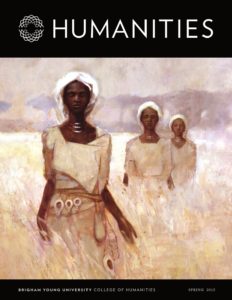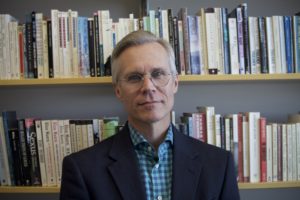
Matthew Wickman, a Professor of English and Founding Director of the BYU Humanities Center, is teaching a senior seminar at BYU entitled “Literature and Spirituality”. In this essay he discusses the thinking that went behind the class. This post will be followed by a series of posts with essays by his students written for the class.
Feelings for a transcendent reality. A zest which adds itself like a gift to life. An assurance of safety and a temper of peace. A preponderance of loving affections. A holistic, integrative approach to life. A concern for what is sacred and meaningful. Care for what promotes human thriving. Heightened cognitive activity that connects ideas, memories, and emotions. Transformative experience with the Spirit of God.
These are just some of the ways everyday thinkers – scholars, not mystics – have described spiritual experience.[i]We might add other descriptions: “The spiritual center is the deepest center of the person: the place of surrender to authenticity and love.”[ii] “[S]pirituality means following intuitions that can lead to fullness of life.”[iii] Spirituality is “the divine-human relational process,”[iv] or “prayer without ceasing … prayer spread across the many works and habits of each day.”[v] And so on. All these insights assert the blessed effects of such experience.
They also have something evocatively literary about them, I would say. Each suggests that spiritual experience occurs at the limits of what we currently perceive as true, and that it is dense and layered with diverse impressions (familiar and uncanny, quotidian and sublime) that give our lives meaning. To imagine that spirituality occurs at “the deepest center of the person” makes the path to spiritual enlightenment a quest narrative. To say that “following intuitions that can lead to fullness of life” makes it a romance. To describe it in terms of a “divine-human relational process,” one sphere inflecting the other, evokes the workings of metaphor (defined most simply as “this is that”: say, God is love), the central figure of poetry. And so on: literature is a natural vehicle of spiritual experience. And so, put all these accounts and implications together, grace them with the touch of narrative or poetry, and a portrait emerges of spiritual experience as something vital, vibrant, and transformative, attuned to what in us most profoundly is and is becoming.
None of this was clear to me five-plus years ago when I decided to teach a senior seminar on the subject of literature and spiritual experience. I perceived the connection between literature and spiritual experience as through a glass, darkly. I was a literature professor and wrote regularly about literature’s relations to other things: history, philosophy, law, even mathematics. In some ways, too, I imagined my professorial life as a kind of spiritual odyssey that began when I was a missionary in France and Switzerland, when literature began to seem like a way to understand foreign people and places, and thus a medium for reflecting on the mystery of the human condition. But I had never thought to explore, directly, the connection between literature and spirituality until one day, frustrated by an inability to come up with a course topic, I asked myself a basic question: “What do I care about?” Not “What am I working on?” or “What is trendy?” Just “What matters to me?” And the answer was immediate, clear, and, I thought, non-literary: “I care about my relationship with God. I care about spiritual experience.”
I had no idea how to teach such a course; “literature and spirituality” has no clear field in academia. So, anything I tried was going to feel experimental. And vulnerable – almost confessional. And, oddly, strangely transgressive: thinking and teaching outside the box. My first time through the course felt a little like walking on water, surprised with every step that the substance of our discussions seemed to support the weight of the examination we brought to it. While we discussed some religious texts – some poems by Gerard Manley Hopkins, for example – most of our discussions were of (supposedly) secular texts: poetry by William Butler Yeats or Wallace Stevens, fiction by Virginia Woolf or Alice Munro, and so on. With the assistance of both scriptural passages and scholarship (religious and secular), we would ask ourselves, in approaching a text, how it seemed to define spirituality, how that text’s definition corresponded or differed with our own, what effect spirituality seemed to have in this text. What did it mean for a text’s language, its themes, its characters – and its readers? What did it open in our understanding of spirituality – things we commonly experience but rarely discuss in church settings (like the relationship between spirituality and divine silence, or spirituality and suffering, or spirituality and ambiguity)?
As I have continued to teach this class, I have refined it and explored with students how studying spirituality by way of literature changes – expands, intensifies, enriches – how we learn and who we become. It is my favorite course, the most fulfilling (by far) I have ever taught. I had the opportunity to teach it during the winter 2020 semester, and was so moved by student writing in the course – so moved by student insights into the relationship between literature and spiritual experience – that I posted excerpts of their papers (with their permission!) on social media. That is when Association of Mormon Letters contacted me and asked whether I would be interested in sharing some of the contents of our course for the AML blog.
What will follow are a few short student essays on the relationship between literature and spiritual experience. I hope you will appreciate, as I have, the diversity and depth of their insights.
[i] I draw here from William James, The Varieties of Religious Experience: A Study in Human Nature (New York: The Modern Library, 2002), 528-29; Philip Sheldrake, Spirituality: A Brief History (Malden, MA: Wiley-Blackwell, 2013), 3-4; and Wesley J. Wildman, Religious and Spiritual Experiences (New York: Cambridge University Press, 2011), 104. I distill the paragraph’s concluding sentence from scripture and several faith traditions.
[ii] David Perrin, Studying Christian Spirituality (New York: Routledge, 2007), 22.
[iii] Elisabeth Hense, Frans Jespers, and Peter Nissen, eds. Present-Day Spiritualities: Contrasts and Overlaps (Leiden: Brill, 2014), 5. In A Secular Age, Charles Taylor also famously invokes spirituality as “fullness of life.” See A Secular Age (Cambridge, MA: Belknap Press of Harvard University Press, 2007), 5-16 and 600-07.
[iv] Kees Waaijman, Spirituality: Forms, Foundations, Methods (Leuven, Belgium: Peeters, 2002), 6.
[v] Andrew Prevot, Thinking Prayer: Theology and Spirituality Amid the Crises of Modernity (South Bend, IN: Notre Dame UP, 2015), 17.
Matthew Wickman is Professor of English and Founding Director of the BYU Humanities Center. His interests include interdisciplinary literary and cultural studies, Scottish literary and intellectual history, critical and literary theory, and literary and intellectual history. For three years (2009-2012) he held a joint appointment between BYU and the University of Aberdeen in Scotland, where he was Senior Lecturer of Scottish Literature, returning full-time to BYU in 2012 to help launch the Humanities Center.
He is the author of more than thirty articles and book chapters and two books, The Ruins of Experience: Scotland’s “Romantick” Highlands and the Birth of the Modern Witness (U of Pennsylvania Press, 2007) and Literature After Euclid: The Geometric Imagination in the Long Scottish Enlightenment (U of Pennsylvania Press, 2016). He is currently returning to the subject of his first book, experience, by way of a series of essays on the relationship between literature and spirituality.

